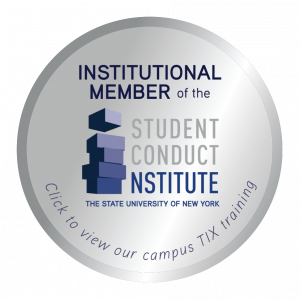- About Ramapo
- Academics
- Admissions & Aid
- Student Life
- Athletics
- Alumni
- Arts & Community
- Quick Links
- Apply
- Visit
- Give
Title IX
Report an Incident
Ramapo College strongly encourages reporting of all incidents of sexual violence and sex discrimination in order for students to protect themselves and others.
Get Confidential Support
Help is always available for victims and/or survivors of sexual assault and interpersonal violence. Confidential resources allow you to explore your options without making a report to the College.

The Office of Title IX supports Ramapo College’s mission by ensuring a campus culture free from discrimination and harassment on the basis of sex, gender, gender expression, sexual orientation, and pregnancy. The Office safeguards the civil rights of all students, faculty, and staff and promotes equity and access in all programs and services in compliance with Title IX of the Education Amendments of 1972 (“Title IX”).
Ramapo College is committed to preventing discrimination and taking immediate steps to address reports of sexual harassment, violence, and discrimination.
What is Title IX?
Title IX of the Education Amendments of 1972 (“Title IX”) charges educational institutions with creating learning environments free from sex and gender-based discrimination. Under Title IX, Ramapo College is required to respond and remedy sexual harassment, violence, and discrimination. The most egregious forms of discrimination include sexual misconduct such as sexual harassment, sexual assault, rape, dating/domestic violence, and stalking.

Title IX protections are broad in scope. While Title IX is often thought of as a law to advance equality in women’s sports, Title IX also provides federal civil rights that prohibit sex discrimination in education programs and activities including:
• Admissions
• Financial aid
• Housing facilities
• Courses, academic research and other educational activities
• Career guidance, counseling or other education support services
• Athletics — scholastic, intercollegiate, club or intramural
• Employment, training for employment or advancement in employment
Title IX protects all individuals from sex-based discrimination. Female, male, and gender non-conforming students, faculty, and staff are protected from any sex-based discrimination, harassment or violence regardless of their real or perceived sex, gender identity, gender expression, and pregnancy/parenting status.
Gender-based harassment may include acts of verbal, nonverbal, or physical aggression, intimidation, or hostility based on sex or sex-stereotyping, even if those acts do not involve conduct of a sexual nature.
Compliance with the law is everyone’s responsibility at the College. Title IX applies to students, staff, faculty, visitors (including children) and business vendors at the College, and to sex discrimination or sexual violence which occurs on campus, at College-sponsored events and programs held off-campus; or that may adversely affect the educational environment for members of the College.
Who is the College’s Director of Title IX/Title IX Coordinator?
 Kat McGee, J.D.
Kat McGee, J.D.
Director of Title IX and Institutional Compliance
Office: D 104
(201) 684-7220
kmcgee@ramapo.edu
What does the Director of Title IX/Title IX Coordinator do?
The Director of Title IX is responsible for ensuring effective and timely responses to complaints of sexual violence, misconduct, discrimination or harassment by implementing Title IX related policies, coordinating appropriate training and resources, and identifying ways to prevent future discrimination. This includes management of grievances, investigations, and the disposition of complaints of sexual harassment, violence, rape, and discrimination under the Sexual Misconduct Policy.
The Director of Title IX is responsible for monitoring the overall implementation of Title IX for the College and coordinating compliance efforts. The Director helps to ensure that all students, staff, administrators, and faculty are trained and educated about Title IX. The Director of Title IX reports to the Chief Equity and Diversity Officer of the College.
Title IX FAQ
The following frequently asked questions and answers are intended to provide general information related to sex discrimination and sexual misconduct. Please review the full Sexual Misconduct Policy for complete information.
Title IX only apply to women? No, Title IX protects both men and women, regardless of sexual orientation or gender identification, in any educational institution receiving federal funding.
What are examples of sex-based discrimination? (applies to those who have experienced or have witnessed discrimination/harassment):
- Sexual harassment (including stalking and cyber stalking or harassment);
- Sexual violence (such as rape, sexual assault, sexual battery, domestic violence, dating violence and sexual coercion) including occurring in connection with any academic, athletic, extracurricular, co-curricular, or any other college program (irrespective of the program’s location); Prohibited Sexual Misconduct at Ramapo College includes Sexual Harassment, Sexual Assault, Rape, Sexual Exploitation, Stalking, Dating Violence, Domestic Violence.
- Unwelcome sexual advances, requests for sexual favors, and other verbal, nonverbal, or physical conduct of a sexual nature;
- Decisions made by a member of the faculty or staff (such as grading) that are based on the student’s sex or gender;
- Failure to provide equal opportunity for participation in athletics, sports, and recreation.
What role does the College have in addressing sexual harassment and sexual violence? The College must respond promptly and effectively to all allegations. If the College knows, or reasonably should know about sexual harassment or sexual violence, the College is required to take prompt action in order to stop the actions and prevent a recurrence.
Who is a Confidential Resource? Confidential Resources are individuals who are not obligated to report information that is given to them. This allows a student to explore his or her options in order to make informed decisions. Conversations with these individuals are confidential:
1. Healthcare professionals – Health Services provides emergency contraception, testing for Sexually Transmitted Infections (STI’s), pregnancy testing, and more. These services are provided free of charge for survivors of rape or sexual assault.
2. Licensed Professional Counselors in the Counseling Services: when contacting Counseling Services please request a confidential counselor. Licensed Professional Counselors in the State of New Jersey whose official College responsibilities include providing mental health counseling to members of the campus community are not required by Title IX or the Clery Act to report any information regarding an incident of sexual violence to the Title IX Coordinator or other College official. Information received by Licensed Professional Counselors regarding suspected abuse of children will be reported, as required by applicable law.
3. Pastoral Counselors – A pastoral counselor is someone who is associated with a religious order or denomination, recognized by that religious order or denomination as someone who provides confidential counseling and who is functioning within the scope of that recognition as a pastoral counselor at the College. At Ramapo, there are clergy and others appropriately recognized as fitting that definition who are associated with the Council for Faith and Spirituality. For more information about available clergy please visit www.ramapo.edu/ministries/.
Who is required to report sex discrimination or sexual violence to the Title IX Coordinator? Mandatory Reporters are required to report incidents of sex-based harassment or sexual violence that they are aware of that they are aware of, regardless of whether the victim or informant has requested confidentiality. All faculty and staff who learn of incidents of sexual assault, rape, stalking, domestic violence or dating violence MUST report it to the Title IX Coordinator within 24 hours (unless the employee is a designated confidential resource such as a counselor in the Counseling Services, medical professional in Health Services, or a recognized clergy person acting in the role of a pastoral counselor.)
Do I have the right to contact no one if I have been sexually harassed, raped, or sexually assaulted? Yes, you control who you tell and how much information you share. However, the College encourages prompt reporting of sexual harassment and sexual misconduct, so the College may take prompt steps to end the misconduct, prevent the recurrence, and to remedy the effects of such harassment or violence. Even if you do not want to make a report so an investigation can occur, we strongly encourage you to visit the Counseling Services to discuss your options and to get mental health assistance/counseling services, victim advocacy, and support. Please request to speak with a confidential counselor if you do not wish to make a formal report of the sexual misconduct.
If I disclose my incident to a faculty member so I can get an accommodation in class, like an extension on a paper or a test, what will happen? Your faculty member is a Mandatory Reporter under Title IX, and as such, will have to report information you provide to them to the Title IX Coordinator, including your name. If you need an accommodation, the best thing to do is to tell the Title IX Coordinator directly (or tell your faculty member, who will report on your behalf.) Reporting still gives you control over how much information you share and the College is still required to provide you with on and off campus resource information and support.
College Policies Related to Title IX
Sexual Misconduct Policy
The Sexual Misconduct Policy prohibits all forms of sex and gender-based harassment, violence, and rape. The policy also provides reporting options, resources, and information about investigation procedures.
Notice of Non-Discrimination
The College is committed to maintaining an environment free from harassment and discrimination for everyone and does not discriminate on the basis of race, sex, national origin, religion, sexual orientation, gender identity or expression, or any other protected status. The New Jersey Law Against Discrimination (LAD) and federal civil rights laws prohibit discrimination/harassment by or against students based upon the following protected categories: race, creed, religion, color, national origin, nationality, ancestry, age, sex/gender (including pregnancy), familial status, marital/civil union status, affectional or sexual orientation, gender identity or expression, domestic partnership status, atypical hereditary cellular or blood trait, genetic information, disability, (including perceived disability, physical, mental and/or intellectual disabilities), or liability for service in the Armed Forces of the United States. Further, the College does not discriminate on the basis of sex in any educational, employment, or extracurricular activity. Sexual misconduct is a form of sexual harassment which is a form of discrimination and is prohibited by Title IX of the Education Amendments of 1972. Domestic violence, dating violence, and stalking are also prohibited conduct as defined by the Jeanne Clery Disclosure of Campus Security Policy and Campus Crime Statistics Act, as amended by the Violence Against Women Reauthorization Act of 2013.
Title IX is a federal law which provides that no person in the United States shall, on the basis of sex, be excluded from participation in, be denied benefits of, or be subjected to discrimination under any education program or activity receiving federal financial assistance. Ramapo College of New Jersey does not deny or restrict a student or employee from participating in a program on the basis of sex or gender. Title IX applies to students, staff, faculty, visitors (including children) and business vendors at the College, and to sex discrimination or sexual violence which occurs on campus, at College-sponsored events and programs held off-campus; or that may adversely affect the educational environment for members of the college. Sexual violence includes sexual assault, rape, dating violence, domestic violence, and stalking. The College’s Title IX Coordinator is Kat McGee, (201) 684-7220.
This policy applies to protect all students from discrimination/harassment by others at the College, including students, faculty, staff members, vendors, and contractors. This statement applies to both physical and verbal conduct that occurs at the College, (including electronic communications sent or received on campus) and that occurs at any location, which can be reasonably regarded as an extension of the College. (i.e., any field location, on-line course, any off-site college-related social function, or event, or any facility where College-sponsored activities are being conducted or discussed).
This policy of non-discrimination in the College’s educational programs and activities extends to employment and admission. Section 504 of the Rehabilitation Act of 1973 requires that schools and colleges do not discriminate on the basis of disability in admission, treatment, or access to its programs or activities, employment on its programs or activities. The College’s ADA Coordinator is Kat McGee, (201) 684-7220.
This policy will not be applied to abridge a student’s exercise of free speech or expression which is protected by the Constitution of the State of New Jersey and the First Amendment to the U.S. Constitution.
New Jersey State Policy Prohibiting Discrimination in the Workplace
The New Jersey State Policy Prohibiting Discrimination in the Workplace prohibits employment discrimination or harassment based upon the following protected categories: race, creed, color, national origin, nationality, ancestry, age, sex/gender (including pregnancy), marital status, civil union status, domestic partnership status, familial status, religion, affectional or sexual orientation, gender identity or expression, atypical hereditary cellular or blood trait, genetic information, liability for service in the Armed Forces of the United States, or disability.
New Jersey State Policy Prohibiting Discrimination in the Workplace
Reporting an Incident of Discrimination
Reporting an Incident of Discrimination
To file a complaint at the College about an incident of discrimination, please contact:
Kat McGee, Director of Title IX and Institutional Compliance
Office of Equity, Diversity, Inclusion & Compliance
E-mail: kmcgee@ramapo.edu
Phone: (201) 684-7220
Any student has the right to file a complaint with the Office of Civil Rights of the U.S. Department of Education. Questions about Title IX may be referred to the Assistant Secretary for Civil Rights. To file a complaint with the Office of Civil Rights, please contact:
U.S. Department of Education, Office for Civil Rights
Lyndon Baines Johnson Department of Education Bldg
400 Maryland Avenue, SW
Washington, DC 20202-1100
Telephone: 800-421-3481
FAX: 202-453-6012; TDD: 800-877-8339
Email: OCR@ed.gov
Important Sources of Federal Guidance
Copyright ©2025 Ramapo College Of New Jersey. Statements And Policies. Contact Webmaster.

